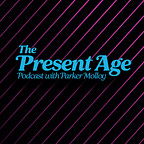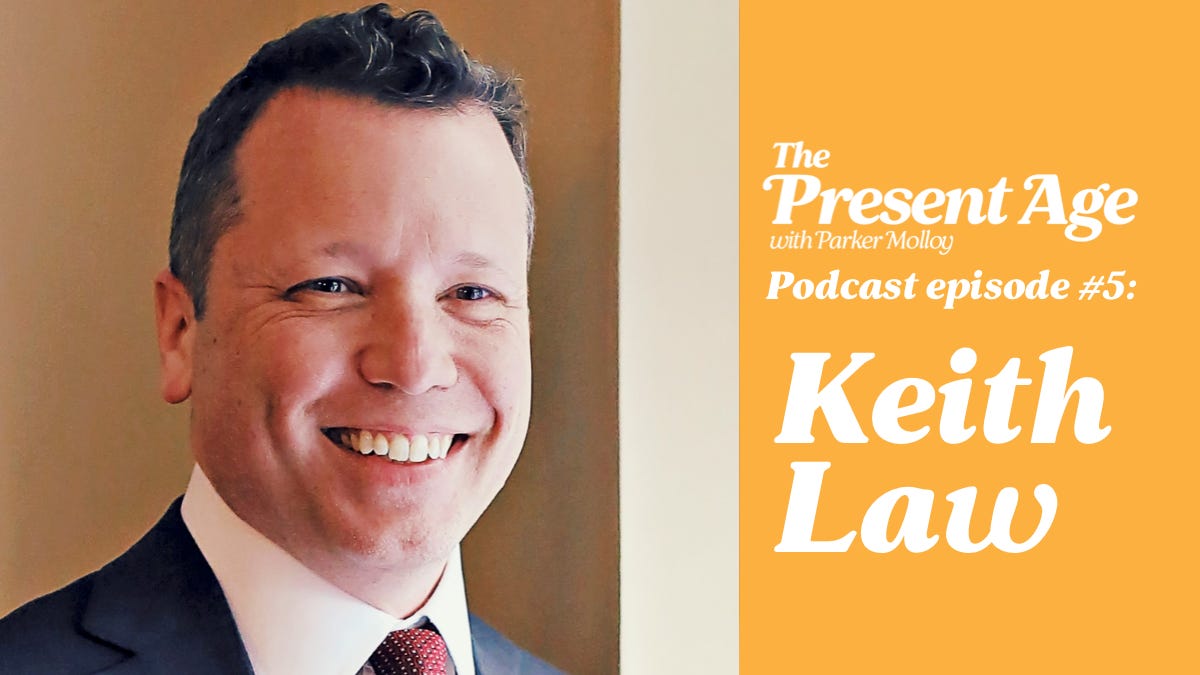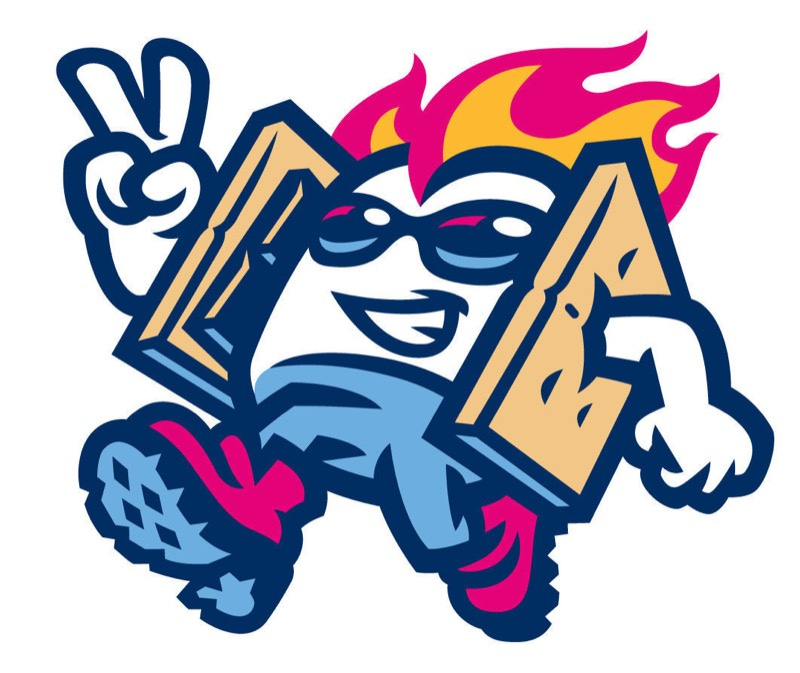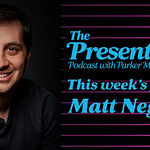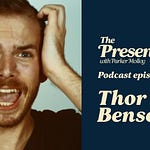Welcome to this week’s edition of the Present Age podcast. I’m your host Parker Molloy.
Joining me on today’s show is baseball writer and all-around good dude Keith Law. Keith is the author of two books — Smart Baseball: The Story Behind the Old Stats That Are Ruining the Game, The New Ones that are Running it, and the Right Way to Think About Baseball and more recently, The Inside Game: Bad Calls, Strange Moves, and What Baseball Behavior Teaches Us About Ourselves.
Parker Molloy: All right. Joining me this week is Keith Law. Hey, Keith.
Keith Law: Hey, how are you?
I'm doing all right. So one of the reasons I wanted to, to kind of have you on here was A, my love of baseball. B, we've been talking for what, like three, four years or something now.
Yeah, I think so.
Yeah. So, and you're just a great person to talk to on Twitter and everything like that. But C, a big part of this podcast and newsletter is, has to do with the odd times that we live in.
And on that front, there were few things as bizarre to me as baseball during the pandemic, which at first it seemed like the 2020 season might be canceled. And then it came back. It was a shortened season, but without fans. And then watching on TV, there were the cardboard cutouts of fans that was kind of weird. And the fake crowd noise that came with it. To me, it was a bit like watching a deleted scene from an Avengers movie where all the actors you have Mark Ruffalo in a mo-cap suit because it's like, he will be the Hulk here when we finish the CGI, but it's not done yet.
Right. “We haven't finished painting in the players yet.”
So that's kind of what it felt like. And it was so odd to me. And I can't even imagine what it was like for you, someone who you cover baseball for a living. So what has it been like writing about and covering baseball in such an odd time?
Yeah. Last year it sucked from a work perspective. It's the first year, since, before I got into the industry. So my first year doing anything baseball professionally full time was 2002, my first year in the Bluejays front office. And so 2020 was the first time since probably, well, before then, that I went a full calendar year without going to a baseball game. I think if you even just count the high school and college stuff I do, I went something like 380 days between going to games, which was, I mean one, just lousy because I like doing it. Right. It's the best part of job is going to the games evaluating players. But also it was just sort of wait, how do I do this? Right. There's so much of my job is so much of it is driven by the act of going to the game and either seeing the players or it's people I talk to when I'm at the games or afterwards, "Hey, I just saw your AA affiliate. This guy looked really good. What's going on with…, Hey, did this guy get a new pitch?"
That's just such a huge part of the rhythm of the job. And then to have basically no minor league, anything, in 2020 and very little college or high school stuff. And I don't really go to major league games much, if at all, because I can watch them on TV and often have better views on TV than I'm going to get at the ballpark. Especially last year where they were like, "Oh, you can come sit in the press box, but you can't go. You can't walk anywhere. We're going to actually physically nail you to your seat."
Oh, fun.
Yeah. So it was just sort of wait, I have to rethink how I do parts of my job. And I would just watch certain players on MLBTV and write pseudo scouting reports like, hey, this is what I saw so far.
It's not great. I don't love it, but this is what we got. At least this year, I did some high school stuff, a couple of college things. I flew once in the spring, once I got my second shot. And then once the minor league started, I could actually go to games. I have been doing that one or two a week, which is less than I would usually do but still at least I'm going out and seeing games. That's been easier. And it's like, "Oh yeah, I remember how to do this. I know what this is." First few were weird. Definitely. But then after a while you sort of get back into the rhythm. It's like, "Oh yeah, I've been doing this for a long time. I think I can do this."
When it comes to the actual Major League Baseball sort of experience, I keep thinking back to... There was that game in Baltimore, during the Freddie Gray protests where the White Sox were playing the Orioles. And it was just so surreal with no sounds. And I kind of wanted that to come back. I was kind of looking forward to this like chill, silent thing, but then they pumped in the fake crowd noise and...
Well, that game was such... Obviously circumstances were terrible, but just from a baseball perspective was so fascinating. It was like, oh, this is what baseball sounds like with nothing else. And it was like, this is kind of cool. I like this. Yeah, you could really hear the crack of the bat. You can hear the pitch hitting the catcher's mitt. To me it captured some of what I like of going to these low-level games whether it's high school or low minors. And I was at a game the other night. Where the heck was I on Tuesday? On my God, so bad. Wherever I went though... Aberdeen, I went to Aberdeen, which usually they draw pretty well. But for whatever reason, this Tuesday night, there was nobody there at all. I could have had a one-on-one conversation with the second baseman, and it would have been we had no problems hearing each other.
And, but there's part of that I absolutely love too, because then I can just hear what's on the field. It actually gets, I don't love all the shenanigans that are there, the music and stuff between. Oh wait, we have a five-second delay. We got to play song. We can't have anybody be bored ever, but whatever, I'm not the audience for them. Right. I'm not the target.
But then it was even more glaring to when they have to pipe in five seconds of Fall Out Boy, because they got to play the latest hits, obviously, that are 20 years old. And then it's no, no, no I was listening to the game. I was really into the sounds of the game. And I love that. That to me is a big part of it. And it's actually very comforting to me when I'm at a game, and it's now the real sound is what's on the field. All the other stuff is very, it's like static where it's very distracting to me, because I try to be very focused on. It's usually I'm focused on a player more than I'm focusing on the game itself, but still it's the same thing. It's the sound. The sound is part of the experience and part of what I love about going to games.
Yeah. Music playing constantly, constantly having different sort of ways to keep the crowd entertained.
Yeah. It's like, they think people are going to leave in the fourth inning if they're not sufficiently entertained. So no, no, no, no, they're here, and many of them have already started drinking, so they're not leaving right now.
Yeah. Well, exactly. And also a lot of the stadiums aren't exactly right in the middle of a city. If you drove out there to go to that game, you are there. But also it just strikes me as so odd that minor league baseball players are famously underpaid and can barely kind of scrape by. And it seems so weird that there's this fun house pushed around them as they're really just trying to get by. I mean, one thing I love about minor league baseball are the hats. I have a bunch of just various, I've got the Rocky Mountain Vibes, which it's a s'more that's on fire, and it's just chilling out with sunglasses, and it's just the best thing ever.
Sure, that's what I do when I'm on fire.
Yeah. No, totally. I mean, that's it. It's perfect. It makes sense. And the reason for so much of that is teams will rename themselves these kinds of goofier things.
Oh yeah, the Jumbo Shrimp. That's one I can't get past.
Jumbo Shrimp. Yeah.
Somebody had me on the radio. I think it was ESPN radio had me on to talk about Cleveland changing their name to the Guardians from an obviously racist team name. And I said, explained why it's a good name. It has a classic feel. It has a local tie-in, et cetera. It's not ridiculous. Right. I at least have this worry that anytime any team's going to have a new name that they're going to pick something that a bunch of people got in a room and they did marketing. And suddenly they're going to, oh yeah, let's... The Jumbo Shrimp is a great name for a minor league baseball team. It would be a horrendous name for a major league team. And that's if you just know baseball, you completely understand. If you don't follow baseball, you'd probably say what is the difference? I don't understand. It's hard to explain. It's just, we have such a dichotomy between what is big league and what is not big league.
Yeah. It would be odd if there was a Major League Team called the Cleveland Trash Pandas.
Trash Pandas. This is the other one I was going to say. Right. I had a choice, right. A friend of mine he's driving cross country because he's moving to Arizona. And he texted me from the Amarillo Sod Poodles stadium. Which another one, I don't even know what that is. Stadium looks nice though. I got to say. I have never been there, but…
See what I've got here. As you can see, I have a bobblehead of the SeaWolves. Nick Castellanos.
Yes. “And there's a drive to left field and that'll make it a four-nothing ballgame.”
Yeah, there it is.
Yes. When I worked for the Blue Jays, the New Haven Ravens I think were sold and the new owners moved them to Manchester, New Hampshire, which they played one year in a temporary field and got a great new stadium. Used to love going up there. And they were the Fisher Cats. What the hell is a Fisher Cat? And turns out it's local. Right. It absolutely makes perfect sense. But it's a weasel. And I would have to say the New Hampshire Weasels probably just wouldn't sell as well. So I mean, I think they made a good choice. That to me also is sort of the difference between it's the same thing. It's the difference between a good name and a bad name. Fisher cat, totally local. Apparently, they're really annoying too, but it's a very distinctly New Hampshire thing. If you're not from there, you don't know what this is. And I, of course, was not. What the hell is a Fisher cat? Oh, it's a screech weasel. But the New Hampshire Screech Weasels just doesn't quite have the same ring to it.
Yeah. I mean, that's a... Imagine being paid poverty wages to play for a team and be like, "I played for some weasels." I don't know. The ownership has fun with our name, I guess, at least so yeah.
Yes. Oh yes. Well, I'm actually very glad to see there's been, I feel, an exponential growth in just among Twitters' baseball, baseball Twitter of acknowledgment that the way minor league players are treated is totally unacceptable in a multi multi-billion dollar industry. And I don't know why this year we hit the tipping point, but okay, good. I mean it's five, 10 years too late, but whatever. We're there. We're getting there. It's a bit of an optimist bias I guess, but it is that, this is progress. We are finally making progress. It's too late, but at least we're moving in the right direction.
Yeah. I think a lot of that sort of comes down to, or a lot of the resistance to some of that you see on Twitter where it's like, oh, well they're playing a game. They should be happy with whatever, blah, blah, blah. That sort of stuff is sort of based on this idea where people will think, oh, well, one person on that team may someday make a hundred million dollars. I mean, yes, one person on that team may do that. Most of them won't. Most of them probably, depending on what level you're talking about, probably won't make it to the major leagues at all. And that's the same discussion we keep having about college athletes as well. Where it's well, they got a free education, which sure, I guess. But at the same time, they're making so much money for their schools and for all the people who go pro, there are so many others too, in football, for instance, just get a bunch of head injuries and have to go about their life.
We see this. So baseball's problem in college is to me, it's twofold. It's different that the football and the basketball players, that's men's and women's basketball players now, they're generating so much revenue for their schools. The fact that the money doesn't trickle down to the players is its own, tragedy isn't the word. It's a crime. To me, it is a crime. I think the NCAA is essentially a cartel. And I would love to see an antitrust case around that. In baseball, most of the players, if not all, I mean, there are almost no players with full scholarships in baseball. So they're not getting a free education. They're getting a subsidized education. Okay, sure. But yeah, those players can get hurt, especially college pitchers. I'm sure you've seen me ranting about these high pitch counts. And if a college player blows out his elbow or his shoulder and has to have surgery and obviously a complication... There was a player at George Mason who had Tommy John surgery and then died.
I believe he got some kind of infection or something, something. He had a completely unusual complication from the surgery and ended up dying from it. Obviously, that is the worst of the worst-case scenarios, but still these are real people who are not paid, but can incur an actual injury as life-altering life-ending complications. And they get nothing. And there is just this group of mostly people whose Twitter avatars are them in their sunglasses taken while they're in their cars who will say things like, "Oh, it's just a game. Oh, they should suck it up." And you're not even having a conversation at that point. Right. And we see this on multiple issues. Obviously it goes way beyond sports, but it's people who just they're so intransigent that they can't even hear supporting argument for the other side, like saying, pointing out that. They're not playing a game.
This is work. They're probably at the ballpark nine to 10 hours a day. And then minor leaguers aren't even paid in the off season, but they have to continue to keep their bodies in shape and continue to at least do things to maintain arm strength or muscle tone or work on their swings on their own, just on their own time for no pay. Very little, no financial support from the team. They may get training support. It is a job. It's a real job, and it's a physically taxing job. And just because what you see... Somebody said this to me on Twitter the other day. "Well, they only work like three hours a day." I mean, that's the game. That's the actual first pitch to last pitch. Hell of a lot more than that. That's like saying an actor who made a movie, "Well, she only worked for two hours." Because the movie was two hours long. So obviously that's all it was. And she should make about 30 bucks, right? $15 an hour, two hours. There you go, that's fair.
Yeah. It's interesting to me because it takes this argument that we see all kind of all over the place where so many people are more concerned about someone getting what they deem is more than they should, for any one thing. It doesn't matter who it affects or what it affects. We hear this when it comes up in discussions about should student loan debt be forgiven. Well, yeah, but what about this one? If someone paid it down and then they're not getting something that's someone else is, or a job that pays really well or something along those lines. And really, I think it's just a great example of the way that as society, we kind of hold each other back in the sense that we're fighting the fight on behalf of billionaires to not pay people. And just the other day, Scarlett Johansson sued Disney over how they released Black Widow, because she took a deal that was really heavy on the box office numbers.
And Disney cut her out of the Disney plus stuff that they did when they released it. And so many people are rushing to defend Disney in this. Yeah, she's one of the highest-paid actresses on the planet, but she's still the little guy in this situation. If Disney can screw her over, they could screw anyone over. And that's kind of the thing that gets lost so much because so much of us would kill to be in Scarlet Johansson's place, fame and finances and all of that. But we end up defending billionaires and millionaires and all of that.
And we defend Corporations. That's the thing I can't understand. And trust me, I'm no socialist here. There is a weird, I can't even call it a capitalist. It's like this weird corporatist status that the people who jump into defend Disney. And I worked for Disney for a long time. Actually, as companies go to work for they're pretty good, actually. Benefits were always very good. And they were progressive on at least many issues. But this idea that first of all, Disney, they're not going to love you back. Right. That's definitely true. I don't know what the goal is of defending a multi-billion dollar conglomerate like that. But I feel like people see an individual who's already rich, Scarlett Johansson in this case already very rich. And they say, well, it's not fair that she gets money.
And they can't do the same thing with the company on the other side, the company just not being a person. Although I think Supreme Court said companies are people. So maybe I should rethink this, but that they can't understand that. So they immediately see person asking for "too much" money. I'm air quoting the too much here. And they get mad, "That's not fair." Which I have three kids, and they're all at different ages. And yet, "That's not fair," is just like the common vernacular of the household, right? Nothing is, they're so locked in on fairness. And there is a part of me that just wants to scream. "Hey, the world is not fair. We're just preparing you for this." And that's what I see when I see these people saying it's not fair that Scarlett Johansson wants more money.
No, she actually wants what she was contractually entitled to get. And Disney doing an end run around the contract is not legal and something we should all oppose. Right? If companies can just run rough shot over contracts they have signed, negotiated and signed in good faith, then we're all screwed. We absolutely should be reading for Scarlett Johansson. It's not even so much about, I don't care what dollar figure she gets.
I want the contract to be upheld because hey, I did sign contracts with Disney, as it turns out. And they upheld their terms of the contracts, and so did I. And we should absolutely want that to be in place. And that's why you should be supporting Scarlett Johansson in this particular lawsuit, but people don't see that. They just see, and probably worse because she's a woman, obviously a woman asking for more money. And that becomes a, that's not fair. I don't like that. And that's the end of it. And you can't argue against, you can't have a conversation. You just laid out the argument of why Disney is acting, probably acting in bad faith here. You can't get to that point because the sunglasses, Twitter, avatar crowd is they can't get past fair.
Yeah. They ended up running interference for these companies to avoid having to do that.
Yeah, they're like an unpaid social media SWAT Team.
Yeah. To me, it's even weirder when you see especially in the Twitter mentions of Elon Musk. His fan base, the dudes who love him, who would jump in front of a bullet for him, they are something else. For the life of me, I cannot figure out what the end game is here, because there are people who will be like, "Oh, I love Tesla. I got laid off, but I love Tesla still." And all of this, blah, blah, blah. It's like, "They laid you off, man. You don't have to be happy with them."
You get to be mad actually.
You can be kind of irritated. That's fine. But they'll do that. And they'll be like, "How dare you speak ill of Elon just because he wanted to put people back in the factories during the middle of a COVID surge." It's like, well, you're there because you just explained why." Yeah. I don't know if they think that someday, like Elon Musk is just going to be like, thanks for defending me, here's a million dollars. Because he could.
Yes he could and not miss it.
Yeah. I mean, if any billionaires want to just Venmo me a million dollars, I'm cool with it, but I'm not...
Elon would pay in dogecoin coin or something.
Yeah, “If you hang onto this, just wait 40 years,” yeah.
Twitter is toxic to begin with. I think you and I have even talked about this. Anyone who snitch tags, I just block it at this point, because if you tag an Elon Musk, for example, and it's not even specifically about him. You tag someone like that and his followers catch onto it. Forget it. You have to log off for a few days. The site becomes totally unusable at that.
Oh yeah. Oh, absolutely. And that's kind of the sort of, I was trying to explain why people with larger followings have every responsibility to not be jerks on the internet. Because someone will say, "Well, why is it okay for this small account to be mean? But if Donald Trump picks a fight with someone." And it would be like, well, when Donald Trump would pick a fight with someone on Twitter, he was sending tens of millions of people to go and flood that person with all sorts of horrible stuff that could bleed over into their everyday lives.
And it's a responsibility. It's a look at how to respond to things proportionally based on your own position, the position of the other people that you're criticizing. And I tried to explain it once as it's like if you're at a baseball game, for instance, and you're standing there and suddenly a beer spills on your head. And you turn around, ready to fight the person who poured a beer on your head, and you see that it was a baby that knocked it out of their mom's hand or something. Are you going to punch the baby?
I mean, some of these people might.
They might. And that's where I maybe need to recalibrate that little analogy for a bit. But it's the idea stands up, I think, where don't punch the baby. That's my house.
This is where we've sunk as a society that we have to remind people not to punch the baby.
See, I'll do that, and someone will be like, well, because you told me not to punch the baby, I am going to punch the baby's so much harder.
Oh, yeah. I got that for pointing out that Anthony Rizzo is essentially, he's a vaccine refuser, called him an anti-vaxxer. To me, that is a distinction without a difference at this point. If you have to come out and publicly say, you're not getting the vaccine, you're an anti-vaxxer at this point. And somebody said it's because of people like you, that the rest of us will be defiant about not getting the vaccine. First of all, you're going to get COVID to own, who me? Okay, sure. But if that was all it took, I have many more questions.
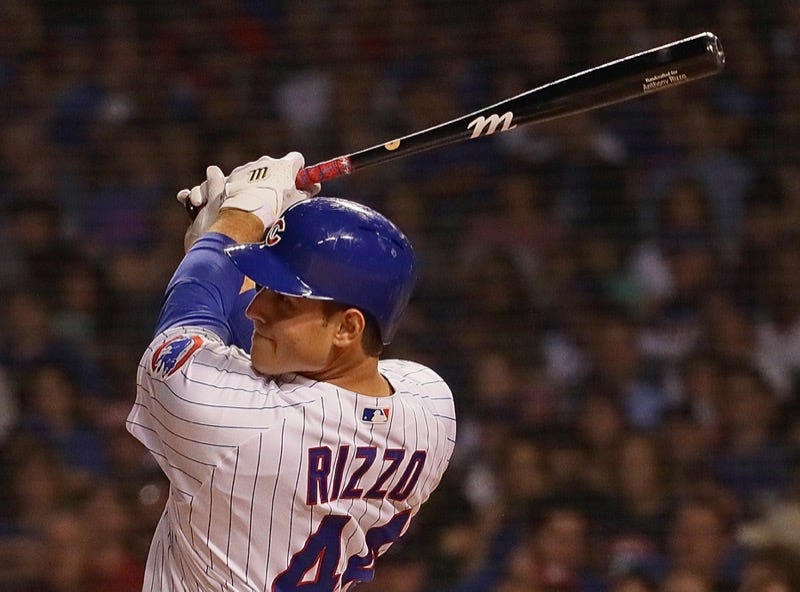
We're doomed.
We are doomed. We are definitely doomed.
Well, and that was another thing I wanted to quickly ask you about with athletes. What they say matters and what they say can influence people, because people look up to athletes. I look up some athletes and if they say something I'll go, oh. If Sean Doolittle says something, I'll be like...
I was just going to say, he's our guy.
Sean is my favorite guy on the planet. And I was at the Cubs game. He did not pitch again. Never seen him pitch in person. I've been to games where he's been on one of the teams several times, which is just so weird. But, yeah, if Sean says something, if he says, check out this band or something or takes a political position or something on something, I'll think about that and I'll consider it. And I'm sure that there are people who look up to Anthony Rizzo or in the NFL, what's his name? The guy on the Buffalo Bills, the receiver...
Beasley. Beasley, that's it.
Who won't stop talking and can't wear his mask properly.
Yeah. And then the Bills promoted that tweet that they put up.
I saw that.
It's just why? But so my question to you is what responsibility do you think that athletes have in these sorts of situations? Because I think if the messaging is the issue with getting people vaccinated, for instance, what moral or ethical responsibility, if any, do you think that athletes have to at very least not spread harmful information?
Right. To me, what they say and how they behave is separate from whether they get vaccinated themselves. And I hate even talking about it as a choice because I think there is a huge, personal and civic responsibility to get vaccinated that has been there the whole time. That's been there since April. I think it's even greater now. And now we are seeing, Kay Ivey and Asa Hutchinson, Brian Kemp, Republican governors of states that are now getting pounded by the Delta variant are all coming out and saying in various ways, get vaccinated. I thought, Kay Ivey, look, I'm not going to agree with Kay Ivey on basically anything. But I liked what she said, we got to blame the unvaccinated people here. Good for, yes. Good. You should've said this six months ago, but good.
Yeah. Better late than never.
Yes. Again, I believe in any progress is good even if it's late. I will take progress over because the alternative is regression. But I think that athletes or anyone with a platform has a responsibility to you would hope to say the right thing, but say the right thing, or just say nothing, just don't, but they're spreading misinformation. They are repeating anti-vax tropes. We're waiting for more data. That's my favorite one. You don't know how much data there is. You have no fuckin idea how much data there is clearly, if you start saying stuff like that. You are just repeating something you saw on Facebook or a parlor or whatever. And so some of that could come down to the teams too. I think it would... Anthony Rizzo talked about he made a comment like that back in April. And he was saying his immune system was the strongest it's ever been as another implication of sort of, I don't need this vaccine. This great strong immune system.
Which struck me as odd, given that he's a cancer survivor.
He's a cancer survivor, 13 years ago. Yes.
He knows how this stuff goes.
You would think right? But I will also put a little bit on the Cubs in this. And maybe all teams were just unprepared for this, or didn't think about what could happen when you stick a bunch of microphones in front of a bunch of players and ask them what is kind of a science question. You can say, "Hey, you're going to get asked about this. We can't make you get vaccinated. We'd really like you to get vaccinated, but we can't make you. Here's how we would like you to answer questions about vaccinations if you're asked, especially if you are a vaccine refuser." There are way better ways to approach that.
Yeah, well absolutely.
And I just come down to, if you have a big platform, you have a responsibility. And that includes the responsibility to say less. That is something I've tried to practice myself in the last couple of years is to say less, to make sure I'm not inadvertently sending a swarm of my followers at somebody because I have enough followers. I don't have a huge following, but I have enough of a following that it could happen. Right. And also to not spread misinformation. I wouldn't do it deliberately. I think I try to be a critical thinker, but I'm subject to, I can make mistakes too. And so sometimes the best response is just saying less. And I don't want to misuse the platform. I think it's a privilege to have that many people following me and obviously interested in some things I have to say. And that means being judicious in what I do on the platform. And I would say the same thing to players. This is not actually about whether you're getting vaccinated. It's about what you say in public because it will affect how people think.
Yeah, exactly. And that's a great point. That's pretty much all I've got. I just wanted to pick your brain for a little bit before letting you get back to a trade deadline madness.
I don't think anybody's been traded since we started talking. So that's good. I couldn't get to sleep last night because every time I was like, "Oh, I finished up." Okay. "Wait, the Dodgers did what?" Yeah.
“They're getting who?”
Yeah, thank God I knew the prospects because there's always the chance in one of these deals where it's like, oh God, I got to find a scout who saw so-and-so because it's a player who... Players get traded now where they've got almost no pro experience. Guys are getting traded out of the Gulf coast league or whatever, I call it the Florida man league. I think they're calling it the Florida Complex League, which I understand it's at the complexes, but it makes it sound like the league itself is actually complex. And it's like, no, it's really not. It's pretty simple, actually. But the worst part of the trade deadline. I mean, my job is to know as many players that I can, but I can't know them all. And it's like, someone's going to get traded at 3:58 today, two minutes before the deadline and be like, "I don't know who that is." And then it's the mad dash to the phone. Right? Who can I text? Who can tell me they saw so-and-so play for the ACL Padres?
Yeah, you've got accountant's tax day and you on baseball trade deadline day.
Yes. This is my tax day. That's pretty good. My brother-in-law's an accountant so this analogy works.
You're like, "I know how you feel." But thanks so much for joining me again, Keith. Is there anything you want to plug?
Can I plug my book? Can I even mention my book?
Yes, of course. I already mentioned it in the intro but do it again.
Yes. So my second book, The Inside Game: Bad Calls, Strange Moves, What Baseball Behavior Teaches Us About Ourselves, came out in paperback this April from Harper Collins. You can buy it anywhere you buy books. And I would say, please find an independent bookstore near you. They are probably partially reopened at this point, but they absolutely need our business. So if you do buy it from the big company that shall not be named, I won't complain, but I try to do all my book buying through indie bookstores because they need us. And we are a better society if we have more bookstores. I strongly believe that.
That is a great policy. And what I'll do is I will be linking to some indie bookstores to buy that from.
Awesome.
I will make it as easy as possible for people to get that.
It's a full-service podcast.
Yeah, exactly. But yeah. Thanks a lot, Keith.
My pleasure.


